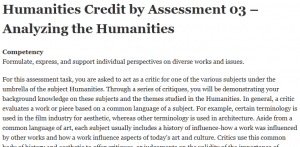Humanities Credit by Assessment 03 – Analyzing the Humanities

Competency
Formulate, express, and support individual perspectives on diverse works and issues.
For this assessment task, you are asked to act as a critic for one of the various subjects under the umbrella of the subject Humanities. Through a series of critiques, you will be demonstrating your background knowledge on these subjects and the themes studied in the Humanities. In general, a critic evaluates a work or piece based on a common language of a subject. For example, certain terminology is used in the film industry for aesthetic, whereas other terminology is used in architecture. Aside from a common language of art, each subject usually includes a history of influence-how a work was influenced by other works and how a work influence aspects of today’s art and culture. Critics use this common body of history and aesthetic to offer critiques, or judgements on the validity of the importance of aesthetic (it’s representation of beauty).
Please watch the video below (02:33 – 16:32) as a refresher on this deliverable’s content. The video will not tell you everything you need to know to pass this test-out, but it should serve as a refresher.
https://rasmussen-kanopystreaming-
com.ezproxy.rasmussen.edu/video/humanities-approach-living-modern-world
part 2
Deliverable 03 – Humanities (Test-Out Sophia Replacement)
Competency
Formulate, express, and support individual perspectives on diverse works and issues.
Instructions
You will act as a critic for some of the main subjects covered in the humanities. You will conduct a series of short, evaluative critiques of film, philosophy, literature, music, and myth. You will respond to five different prompts, and each response should include an analysis of the topics using terminology unique to that subject area and should include an evaluation as to why the topic stands the test of time. The five prompts are as follows:
- Choose a film and offer an analysis of why it is an important film, and discuss it in terms of film as art. Your response should be more than a summary of the film.
- Imagine you had known Plato and Aristotle and you had a conversation about how we fall in love. Provide an overview of how Plato would explain falling in love, and then provide an overview of how Aristotle might explain falling in love.